#a4 size in cm
Explore tagged Tumblr posts
Text
Watercolor Tips and Hints For Stretching Watercolor Paper

Below are the steps on how I like stretching my paper for watercolor. The instructions are interspersed with a variety of tips and tricks to make sure that you don't get caught in the 'traps that young artists fall into'. I'd like this to serve as an information source, so I've covered everything I could imagine that could go wrong to ensure that you have all the solutions when you run into problems.
It's quite easy, but it is a resource for all similar to medication notes . They are filled with details about things we don't be able to experience. Don't get overwhelmed by the facts Stretching is an essential procedure that will give your painting a professional appearance. The process of stretching isn't complicated and will be a second nature process in no time. The tips and tricks listed here will ensure that your painting is properly stretched and that you will not run into unneeded pitfalls during the time of painting.
I've never experienced any issues stretching my paper. If you experience any issues - then it's probably easy. The most frequent cause is the use of the a4 paper manufacturers for stretching the paper. or using the incorrect tape. Unfortunately, there are some inferior tapes available.
Here are the steps and the solutions before you know the question! Enjoy the fun! The benefits from stretching your paper can be many but the main ones are:
Even surface tension that allows paint to flow in a uniform manner and allows for soft blending and stunning, even changes in hue
Stretching reduces the possibility of creating major waves on our paper when we use in the washes of wet - (waves or buckles can result in the pigment sitting in troughs, which is not a great look!)
You'll be tempted to take a break and pour your thoughts on paper. Being forced to fight the effects of a warped surface could hinder your enjoyment during the process of painting and also create a sloppy result. It's wonderful to be able to lay down in beautiful, wet washes and not be concerned of causing runbacks, blooms and the cauliflower blossoms.
#a4 paper size#a4 paper size example#a4 paper thickness#a4 paper wholesale market in delhi#a4 size in cm#caixa de resma de papel a4#papel a4#price of paper rim a4#quarto paper size a4#a4 printing paper#a4 paper for sale#wholesale a4 paper#80 gsm a4 paper#where to buy copy paper#double a paper company#copier paper 80gsm#a4 paper manufacturers#a4 sheet paper
0 notes
Note
As you've asked for asks!:
Do you have any quick-and-dirty book/fic binding methods a terrified-of-failure novice could use to bang something out to get over the first collywobbling step of Actually Doing The Thing? (this may be something I've been meaning to ask for ages)
yes! I absolutely do! in my opinion the best quick-and-dirty bookbinding method is a no-glue pamphlet: you don't have to mess with glue or measuring or cutting anything, all you need is your text, some paper, a needle and thread. you can use the same needle to punch holes if you don't have an awl.
this is going to be a little long but that's because I'm going to write out some fairly detailed instructions for an A5 sized pamphlet. If you don't want detailed instructions and think you can glean the necessary info from photos, just skip to the photos! I've also linked tutorials.
for preparing the text to printing, in whatever software you use (word, libreoffice, gdocs, whatever) make sure your document is set to page size A5. make it look readable. then save as/export that document as a straight-paged PDF. now go to the bookbinder JS tool (https://momijizukamori.github.io/bookbinder-js/), and upload the PDF. source manipulation: none printer paper size: A4 display unit (you can ignore, or choose cm if it gives you anxiety that it automatically displays points) printer type: select single-sided or duplex accordingly* rotate paper: ignore flip on long side: check if you are printing duplex and if your duplex printer flips the paper on the long side page layout: tick folio page scaling: original page positioning: centered ignore the rest flyfleaf: ignore signature format tick: standard signatures. in the length drop down, this depends on the type of pamphlet you are doing. for folio i generally find 4-5 pages per signature a comfortable thickness. if you have 6 whole A4 pages you can still do that as a single signature or you can split it into two signatures 3 pages each. wacky small layouts: ignore this signature info click the generate preview button to see what your PDF looks like imposed! I love this step especially when I'm doing quarto (A6) or octavo (A7) sized books generate output - click this to generate an imposed PDF
for A6 and A7 sized books the instructions are much the same, except for these you make sure the page size is A6 or A7 in your software, and then you choose quarto or octavo instead of folio. for signature length drop down I keep signature length to 1 for octavos typically and 2 for quartos, as this still refers to sheets of paper, and for octavo 1 sheet of A4 paper will turn into 4 smaller sheets in one signature once folded and cut.
*if you don't have a duplex printer you will have to manually turn the paper to print on the other side. I cannot be arsed with this so I bought a printer capable of duplex printing (I didn't have a printer anyway). if you already have a printer check what it can do as you might be surprised and go from there.
now to the pamphlets! you don't need a cover - I have one for the long stitch pamphlet but for the saddle stitch one I didn't bother and just made sure the first page had a title on it. you can always take a different piece of paper and print a cover on or or just use coloured cardstock and create a simple cover, but a cover is not necessary unless you're doing a long stitch pamphlet. all you need to do is to punch holes and start sewing. there are a few different stitch types below, I wouldn't say any of them are more difficult or easier than others, but they do look different so...pick one you like the look of and go from there?
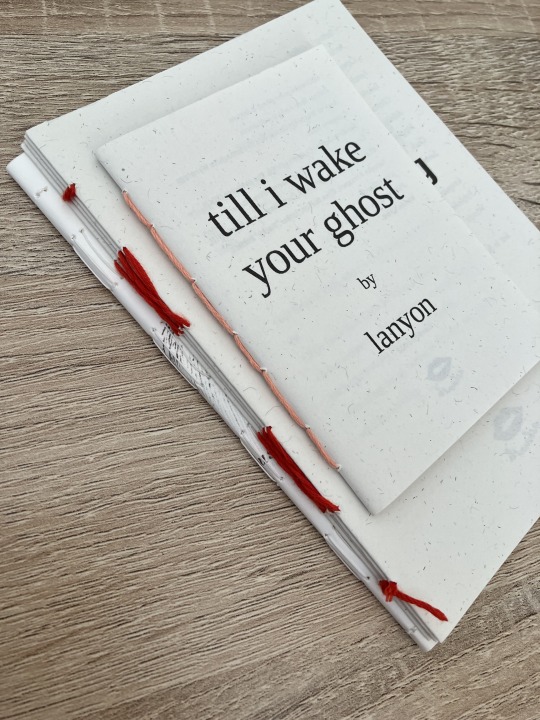
pamphlet stitch (uneven number of holes) I haven't ever done a pamphlet stitch but here's a tutorial for how to do it: https://www.starpointestudio.com/simple-pamphlet-stitch-book-step-by-step/
saddle stitch (uneven number of holes) I realised that what I was thinking of as a pamphlet stitch is actually saddle stitch, as in this A7 pamphlet:
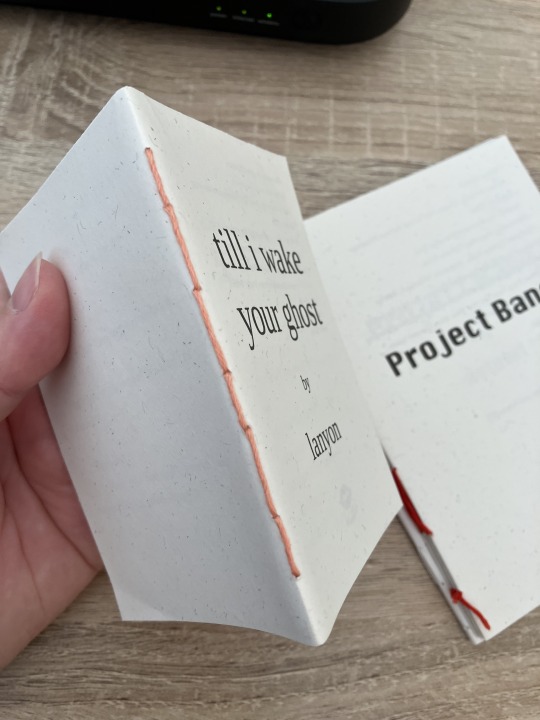
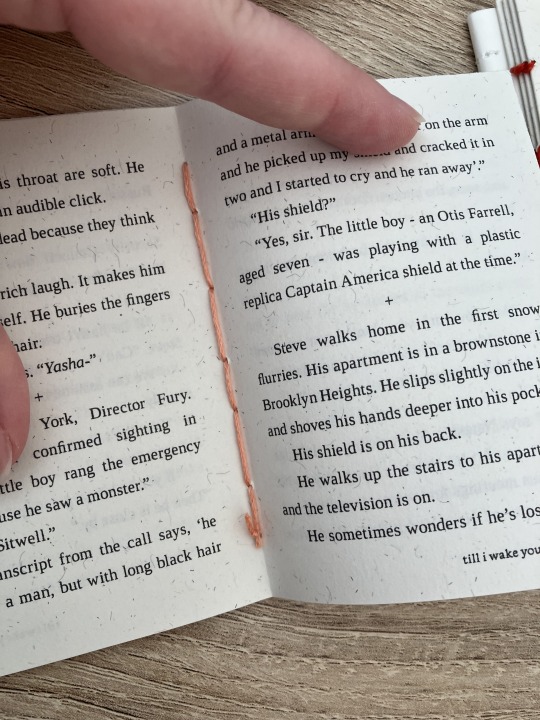
here's a tutorial for how to sew saddle stitch: https://www.bookbindingworkshopsg.com/saddle-stitch-bookbinding-tutorial/ here's a video tutorial: https://www.youtube.com/watch?v=aWHkY5jOoqM (sealemon has a lot of bookbinding tutorials and I know many people who like her videos, I used her tutorial for coptic binding way back when I first made a book but I can't otherwise vouch for the quality as I haven't used her videos)
french link stitch (even number of holes) in this one I used french link stitch which I typically use for thicker textblocks that i'm not planning to use tapes with as the french link gives it some robustness, I used it here because I had never done it before and wanted to try it out. I am planning to take these stitches out and re-sew this pamphlet with a cover now that I've found a suitable piece of transformer fanart to use as a cover:
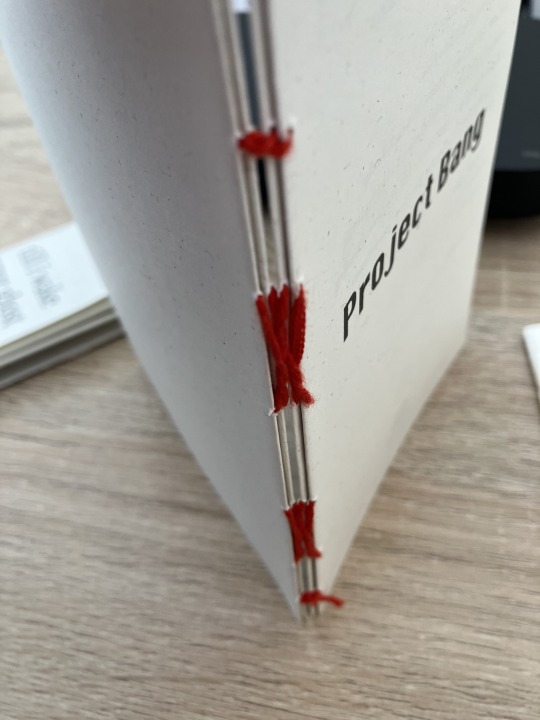
french link tutorial. it's quite long but it has a colour coded bit towards the end that shows how the thread is supposed to link which i find very helpful to visualise: https://www.handmadebooksandjournals.com/bindings/french-link-stitch-binding/
here's a video tutoral from DAS bookbinding (he is my go to for techniques and he has the most soothing Australian accent as well, though fair warning not all of his videos are for beginners): https://www.youtube.com/watch?v=O4ZPdbaM-Ws
long stitch (even number of holes) for this one I used long stitch and I had a cover. this one is my favourite variation because I can make these pretty and simple covers and the stitch looks nice on the outside as well, so this one scratches the 'i want to make a book' itch for me.
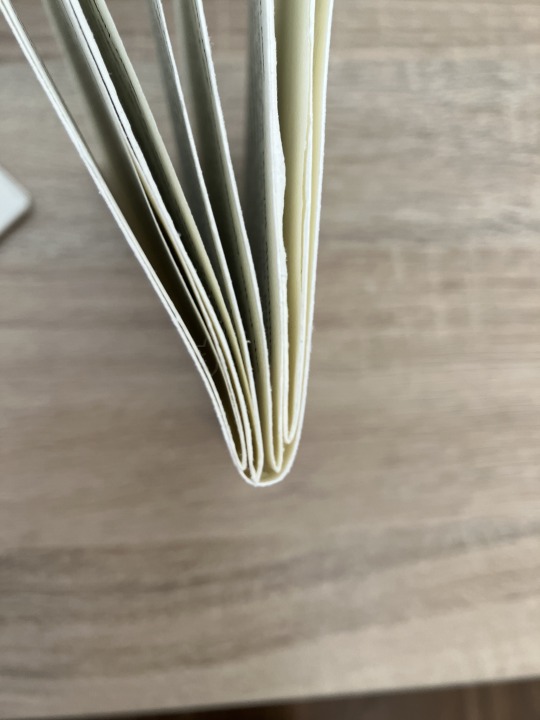
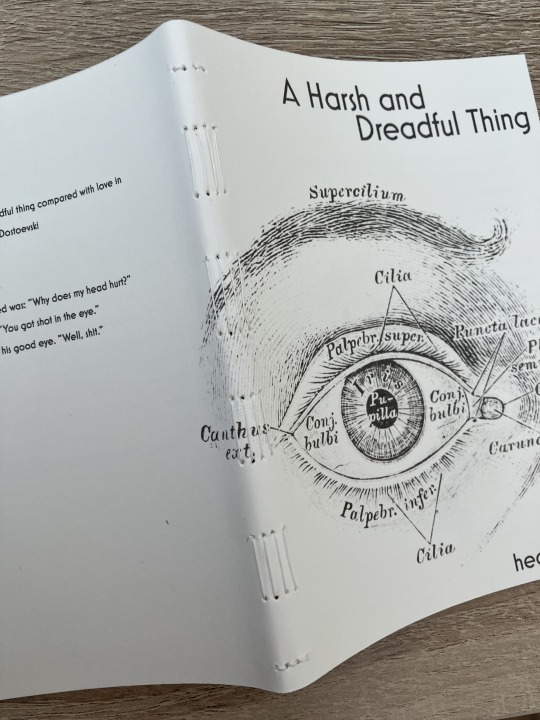
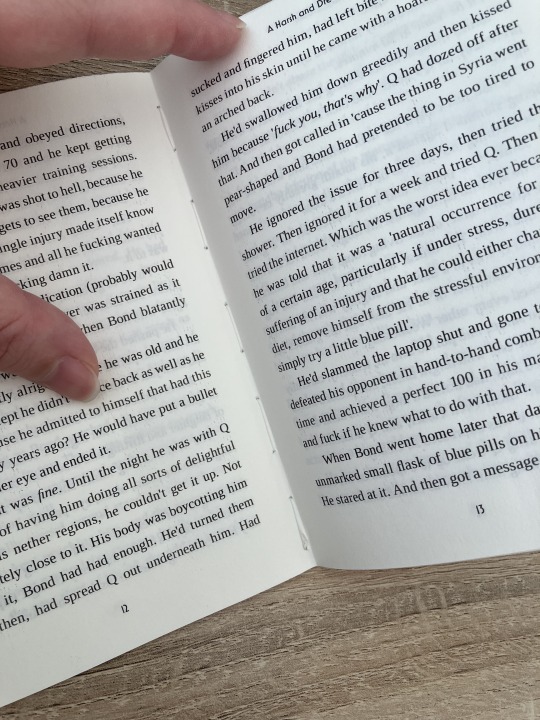
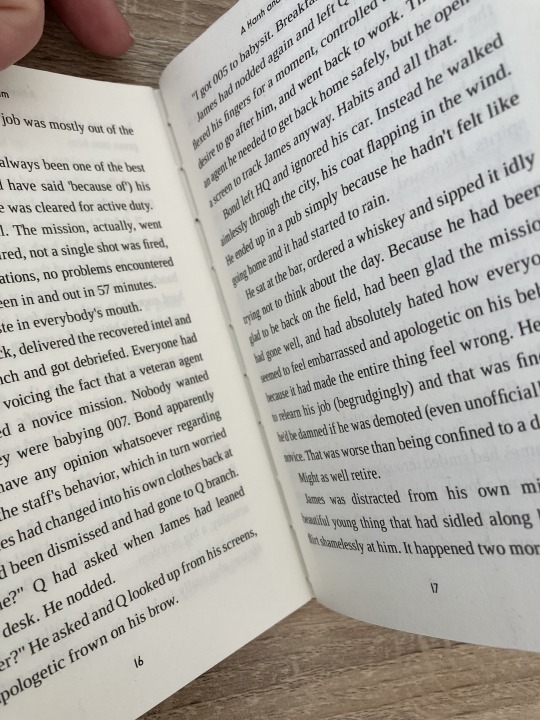
here's a tutorial that also includes a how to on a cover that is different from my cover: https://lccprintmaking.myblog.arts.ac.uk/files/2020/06/Long-Stitch-Tutorial-A4.pdf DAS also has a video tutorial for long stitch but it's like three videos long, maybe watch it later :'D here's one I haven't watched but seems decent: https://www.youtube.com/watch?v=XnignTL_wDQ
you can use saddle stitch for this kind of pamphlet as well, that's what I did for dozens of ships and hundreds of souls (https://ashmouthbooks.tumblr.com/post/681587080267202560).
I hope this helped!!
2K notes
·
View notes
Text

My print ko-fi shop is open for a limited time again!!
Here is the link. It will stay open until Thursday, December 26th midnight EST, graphics will be shipped starting the first week of January.
There are graphics size of 5 x 7 inches (~12.7 x 17.78 cm, slightly smaller than an A5) at €3 per graphic and 8.3 x 11.62 inches (~21 x 29.5 cm, about the size of an A4) at €5 per graphic available, postcards size of 5 x 7 inches (~12.7 x 17.78 cm, slightly smaller than an A5) at €4 per postcard and €10 for the whole set of three, and birthday trading card style cards at 2.5 x 3.5 inches (~6.35 x 8.89 cm, about the size of a trading card) each for €2 and €10 for the entire set of seven.
If you are interested in a graphic not listed, do shoot me a message and I will see what I can do, there is a 99% chance I will be able to list it unless it is a very old graphic :3c
Reblogs much appreciated <3
114 notes
·
View notes
Text

Speckled calf sketch | Limited edition fine art print from an original drawing. My sketches start life as hand-drawn graphite images made on cartridge paper. I often work on these with charcoal, oil pastel or Caran d'Ache to create the look I'm after. The artwork is then scanned and finessed digitally ready for fine art printing. This process often referred to as Giclée printing uses the highest standard of printing methods to give gallery quality results that maintain all the details of the original sketch. The graphite pencils I use are Faber-Castel, the oil pastels are Sennelier and the china-graph is Caran d’Ache. The inks are pigment based archive quality (100years+). The heavyweight specialist papers I use are of the best professional quality having a wonderful surface designed specifically for fine art drawings and illustrations. Very limited editions with only ten per size printed. All artwork is signed and includes a certificate of authenticity. The A5 are 5.8" x 8.25" (14.8cm x 21cm) The A4 are 8.25" x 11.7" (21cm x 29.8cm) The A3 are 11.7" x 16.5" (29.8 cm x 42cm) The A2 are 16.5" x 23.4" (42 cm x 59.4cm) Originals are A3 11.7" x 16.5" (29.8 cm x 42cm) Frames not included in price. Free shipping on artwork to all destinations. https://www.seanbriggs.co.uk/product/speckled-calf/?feed_id=5477&_unique_id=6735a7a3a17be
144 notes
·
View notes
Text
Sewing Zero Waste Culottes from The Craft of Clothes
Zero Waste Culottes From The Craft of Clothes
Behold! Fancy pants!
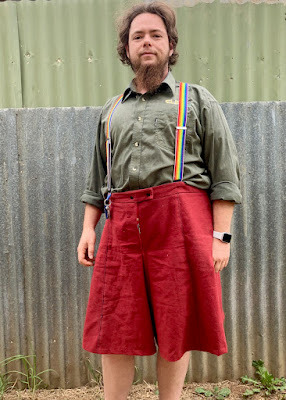
The pattern for these pants was one of my Christmas gifts. It comes from Liz at The Craft of Clothes, a zero-waste designer. I've really gravitated towards self-drafting and zero-waste sewing in the last couple of years, and this pattern has been on my list for a good six months, so I was excited to get into it.
Drafting
The first step (after reading the pattern through twice) is drafting the pattern pieces.
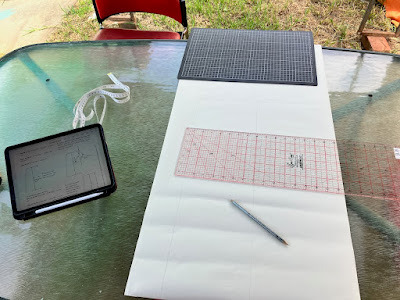
My biggest starting hurdle was deciphering "the culottes are designed to sit on your waist" when choosing the correct pattern size. Most designers consider "the waist" to be the teapot - that is, the true waist. (It's easiest to find if you bend to the side and stick your hand in the crease - like you're singing "I'm a little teapot".) But some consider belly button height to be "the waist". I generally wear my pants at the latter height, and there's a good 2" circumference difference between those two for me.
I eventually decided to call my belly button my waist, on the grounds that that's where I prefer to wear my pants. It's also easier to take seams in than out, if I guessed wrong.
Decisions over, it was smooth sailing from there. Pattern drafting is not a technically difficult process, as long as you have good instructions, and Liz's patterns definitely fit that bill. But there's a lot of attention to detail required to make sure the end result is good. That sort of thing always makes me nervous. Fortunately there was only two pattern pieces to draft, and they're 98% straight lines and based off rectangles.
Interestingly, this is the first zero-waste pattern I've tried that has you draft pattern pieces to use. The others I've seen (most by the creator of this pattern - our library had a copy of her book, Zero Waste Sewing) have had you draw directly on your piece of fabric to create the layout. (In fairness, I didn't have to draft my own pieces. The pattern came with the option of self-drafting, printing on A4, or printing on A0.)
I much prefer the direct-draw method to faffing about with pattern pieces. But given that this pattern is designed to have the pieces tesselate, having a set of physical pattern pieces does make more sense. It's also got me wondering if I could successfully make a pair out of old jeans legs, using one leg per pattern piece. But then, I'm always looking for ways to use up my denim pile...
Sewing
I prefer structure rather than flow in my butt coverings, so I was somewhat limited in my fabric choices for this first pair. (I know the fabric I really want to use, but I am being a sensible apprentice and trying things out on a nice-but-less-hideously-expensive fabric first.) Most of my stash acquisition has focused on stuff for shirts, since I wear those out faster than pants. I eventually settled on this nice brick red, 100% cotton, table cloth.
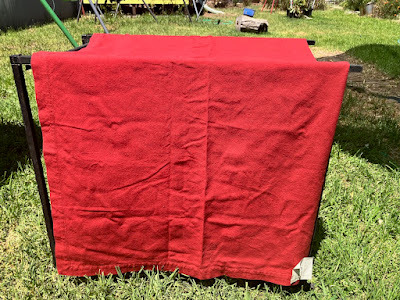
The picture is suffering from sun exposure. It's nowhere near this bright in person.
I laid out the pieces and huzzah! The fabric was just big enough! ... But only if I unpicked the hems (they're monsters, a full 3 cm/1.2" each side) and ironed them flat first. Thus, it was time for a marathon unpicking and ironing session.
After that was done, I checked the pattern fit again. Huzzah! I had enough space for all the pattern pieces, and not very much scrap left over once I'd cut them all out. (Of course, it was late and I wasn't paying as much attention as I should have been, so I didn't add an extra inch when I was forced to cut the waistband in two pieces. There was enough extra fabric that this was only an annoyance and not a complete disaster.)
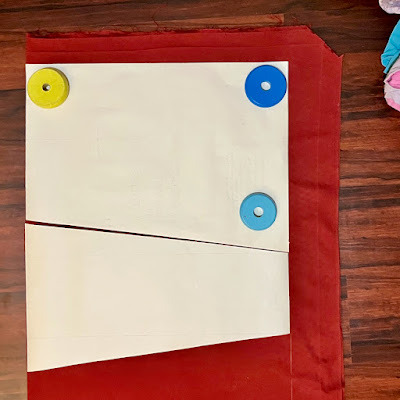
The fabric at the top is scrap. All but a few inches of the stuff on the right became waist bands and plackets.
Sewing was a fairly straightforward exercise, though it required enough brainpower that I completely forgot to take any progress shots as I went. Almost every step of the pattern comes with a diagram to show you what to do, which helped me immensely. So did having the seam allowances specified at each point, as there's three different ones used in different places.
That's not to say I didn't screw up, of course. While sewing the crotch seam, I somehow managed to close up the front of the pants entirely and leave a gap for the placket open at the back. (That will teach me not to double check the direction the pockets are facing before I pin and sew that seam. Maybe.)
I also made a highly decorative and completely awful to sew with choice for topstitching thread, which I quickly became too stubborn to stop using. So the topstitching is, uh, not great. But it is purple and sparkly, and if I'd had any sense at all I would have left it til last (or even done some sort of hand embroidery with it).
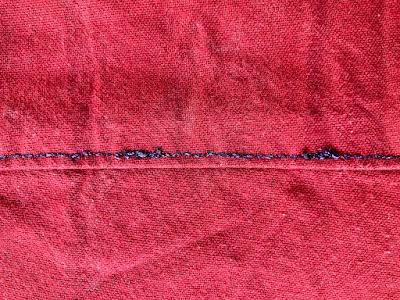
I was tricked by the first line of stitching being so easy. LIES. It was all lies.
Why should I have left it til last? Because it turns out that the culottes are, in fact, designed to sit on one's true waist. Which meant I had a two inch difference between what I needed to fit me, and what the waist measurement was. If I hadn't top stitched the panels, I could have simply ran another line of stitching down the seams that didn't have pockets in the way, and taken the waist in without much fuss or bother. Unfortunately, I didn't do that, so I was left with two choices.
Take out the topstitching and take in all the panels, bitching and moaning about the effort I went to and the number of times the topstitch thread broke while I was sewing the stupid sparkly goodness onto things.
Work out how to take the waist in by the necessary two inches, using only the crotch seam and maybe some darts or pleats or something.
Choice #1 would have been the logical, rational decision, so of course I went with option #2.
An hour and change of basting, pinning and unpinning the waistband, and completely forgetting how seam allowances work later, I managed to get a fit I was happy enough with. I ended up grading in a dart-like object at the centre back. (If I decide later that I'm not happy with the fit after all, I'll try out the modification for adding elastic to the back waistband that the pattern also includes. Probably while questioning my life choices and lamenting the amount of time I spend with a seam ripper in hand.)
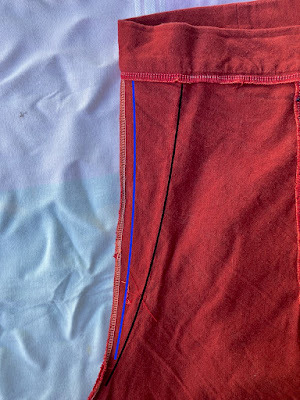
The original stitching line is in blue, the new one is in black.
After all that fitting woe, I wasn't in the mood to try buttonholes (my good machine, the one with the automatic buttonholer, is currently out of action). Instead I dove into my snap stash to close the placket.
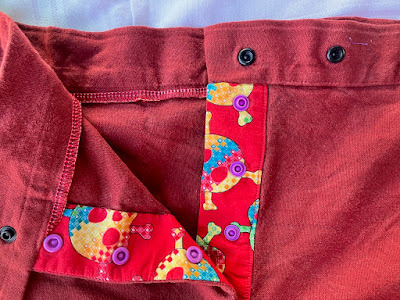
I love using bright, vivid colours for inner details. It's the sewing equivalent of wearing leopard print underwear.
A nice bonus of using the snaps is that I could put them through just the placket, leaving the fly front clean. This did make the placket pull slightly when I'm wearing the pants, exposing a trace of bright red. I fixed that by invisibly whip-stitching through the placket and outer fabric to hold everything in place. Next time I'll also double check the understitching, and topstitch the edge if needed, before installing the snaps.
Field Test and Adjustments
Trying stuff on as you go is all well and good, but nothing tells you what you really need to fix like being out in the field. I quickly discovered several things:
The waistband needs serious help to stay where it's supposed to be. Which, y'know, I did make a size larger than I should have. This was not surprising.
The crotch needs to either drop a wee bit or (preferably) rise a couple of inches. The latter will likely spoil the skirt-effect somewhat, but it will be far more comfortable for my legs.
I need a loop on the waistband to hold my keys.
For the waist woes, I had a few choices - 1) belt loops, 2) suspenders, or 3) add elastic to the back waistband. Belt loops are fiddly to make and sew on, but would solve the key-hanging issue. Suspenders technically wouldn't need any sewing changes, but the clip-on style are notorious for pulling off when you're doing things. And while the pattern includes instructions for adding elastic to the waistband, I wasn't confident it would do the job I wanted (I stick a fair amount of junk in my pockets and elastic can't always cope with the weight).
After some dithering, I went with the suspender option for this pair. I like the look of them, and the "floating" effect they give when they pull the waistband a bit above where gravity wants it to sit is extremely comfortable. But I didn't want to deal with clips always popping off. So I indulged in a quick side-quest of improving my suspenders, then sewed buttons into the waistband of the culottes.
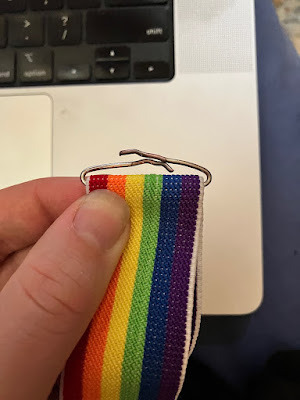
This used to hold the clips, but the wire was easy to bend flat with needle-nose pliers.
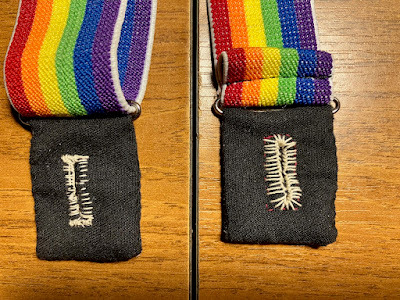
Gee, I wonder which buttonhole I did first?
Fashion Show
Overall, I'm quite happy with how it all came together. I'll definitely be making at least two more pairs - the "men's" version (less flare in the hems), likely out of recycled denim, and a pair in heavyweight stash linen.
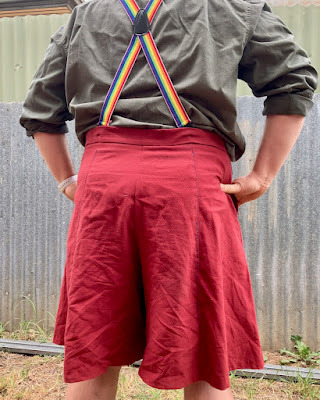
The back panel adjustment is basically unnoticeable.
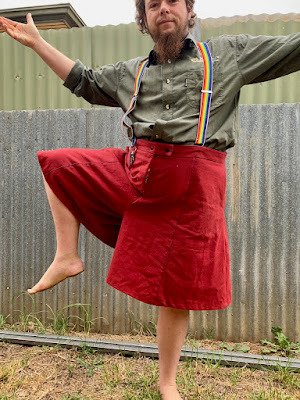
They have great range of movement - maybe I need to make a workout pair?
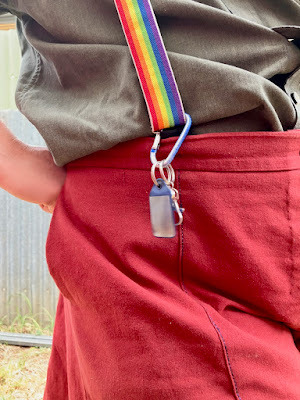
And I even have somewhere to hang my keys.
This post was originally published on my blog, Garak's Apprentice . I currently syndicate my content at Micro.blog, Tumblr, and Ko-Fi.

or Tip me via PayPal
132 notes
·
View notes
Text
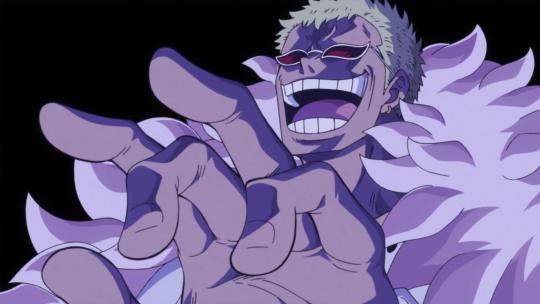
Welcome to Doffy's Physics Lab.
In this post, we'll calculate how big Doflamingo's hands are and how long his fingers are.
Let's dive right in!

Okay, so the thing Oda did very very well is capture how long Doflamingo’s limbs are. He has a very strong chest, and his arms are as previously calculated 1.5m. What I say Oda captured well is actually (after some checking) that the proportions of Doflamingo’s body are not THAT bad compared to irl logic.
The man who has the largest hands in the world is Sultan Kosen (Turkey). His hands are 29 centimeters, but his height is 250 centimeters. Mr Kosen has gigantism and acromegaly, this is why he’s so tall and this is why his hands are bigger. Hands are usually 10% of the body height, so his hands should actually be 25 cm, but biology comes into play here, and after seeing some pictures, his hands look very normal for his size. They fit him. When I say how large the hand is, it means the length of the hand from the wrist to the middle finger.
So, this means, taller people’s hands most likely are not 10% of their height, but 11%. You may be wondering why I only heightened it for 1% percent. 1% proportion increase is about 4 cm increase on the real hand already. This fits for how big Mr Kosen’s hands are and follows bone structure that he has, which we can use to then calculate Doflamingo’s.
Also, body mass and body build goes into account. Even tall people have bigger hands than they should sometimes. Skinny people who are tall may have hands that aren’t 10% their body height, so the mass influences the proportion. The reason behind this is genetics and the aforementioned body structure. So, yes, it can depend! Not everyone has 10%! It doesn’t mean you are not healthy, it varies from person to person!
So, for tall people with a larger body mass, let’s put 10% for now; he is weighty but he is also lean in the arms and legs.
This is how we calculate:
10% proportion
Hand = height • proportion
hand = 305 • 0.10
hand = 30.5 cm
This is already huge. Absolutely huge. His hand is bigger than an average human’s head. His hands are 1.5 cm longer than an A4 paper. Yeah. Awesome! That’s awesome.
Sorry, geeking out and fangirling, please stand by.
Okay, we’re gonna do it with Oda’s proportions now. We’re gonna make it 11%.
The anime makes his hands so big. He a big boy.
This with 11% is the most accurate I like to believe.
0.11 • 305 = 33.55cm
We’ll call this next one the extreme but still possibly accurate version
With 12% body proportion (this is extreme of extremes I think this is too much, but fuck it, One Piece doesn’t follow rules so neither will I)
Hand= 305 • 0.12
Hand = 36.6 cm
These are all big.
Okay, now for the fingers. The anime keeps them good on proportions! Oda, as well! They look outta proportion to us midgets but they’re normal size for Doflamingo.
(rubs hands giddily) Hehe, I wanted to know this for AGES.
For this, we use the length of the hand and then anatomical proportions.
Middle finger is 35-40% of the total hand length
Index finger: 30-35%
Ring finger: 30-35%
Little finger: 30-35%
Thumb: 22-27%
Yeah, for normal people.
Not for One Piece, me thinks. I always imagine Doflamingo’s middle finger is half the length of his entire hand. Big boy has long fingers.
But fine, we’ll go with this first. And THEN we’ll have fun in the One Piece proportions.
Okay, so this is where we need to know the finger-length type classification of the hand. There are 4 types.

Most artists, Oda included, draw the hands with the mountain type ie middle finger is the longest. If there are any artists who can confirm/deny so I can later fix it, that’d be great.
Based on this study with men, their index finger is longer than their ring finger, and only by a few mm. We’re gonna put everything in the middle. We’ll make his index finger 1 cm shorter from his middle finger. Ring and index finger are gonna be the same length to get that “mountain” curve.
Now we will go with his hand being 30.5 cm ie with 10% proportion.
Warning, I am breaking dreams with this one, and once again, I like to think his middle finger is 15 cm long! Is it too long? Maybe. Do I care? No. The fun thing about knowing rules is knowing how to break them.
Formula:
percentage • hand length = finger length
30.5cm hand
Middle finger = 0.40 • 30.5 = 12.2 cm
Index finger = 0.35 • 30.5 = 10.67 cm
Ring finger = 0.35 • 30.5= 10.67 cm
Little finger = 0.325 • 30.5 = 9.91 cm
Thumb = 0.27• 30.5 = 8.23 cm
To put his thumb into visual, 8 cm is the average length 180 cm tall men have of their middle finger.
Okay, now onto the official One Piece proportions the 11%. We just need to have his big hand size, he has HUGE hands. Okay.
33.55 cm hand (most likely to be Doflamingo’s hand size)
Middle finger = 0.40 • 33.55 = 13.42 cm
Index = 0.35 x 33.55 = 11.74 cm
Ring = 0.35 x 33.55 = 11.74 cm
Little = 0.325 x 33.55 = 10.90 cm
Thumb = 0.27 x 33.55 = 9.05 cm
Last Possible Version (Extreme Version)
36.6 cm hand
Middle finger= 0.40 • 36.6 = 14.65 cm
(chokes) Holy Mariejois and celestials. Okay. Okay.
Index finger = 0.35 • 36.6 = 12.81 cm
Ring finger = 0.35 • 36.6 = 12.81 cm
Little finger = 0.325 • 36.6 = 11.89 cm
Thumb = 0.27 • 36.6 = 9.88 cm
Woah, his thumb is huge 🤣🤣🤣 (I have a 30cm ruler sitting on the paper rn so yeah these are crazy numbers)
And there you go.
Okay, now width of fingers, we have no way of calculating it except to use known information.
For example, palm width of a hand of 19.3cm long is 8.9cm. let’s cut our losses and divide that to see how much smaller is the palm (this is cheating btw but it gets the job done). Usually your fingers are half the length of your palm. Sth like that. The palm is drawn mostly as a square or a curved parallelogram depending on the angle in which it’s drawn in. I am going with the easier option where all sides are equal.
We got 2.16
So we can say…
Average Palm width without adjusting for OP proportions
for 30.5 cm hand = 30.5/2.16 = 14.12 cm
Doflamingo’s Palm Width (adjusted for OP Proportions)
33.55 cm hand = 33.55/2.16= 15.50 cm
(I just realised I can just go minus his middle finger because that is how we got the length of his hand omg I am an idiot, no need for complex stuff)
33.55 cm - 13.42 cm = 15.13
(Okay, this is the better and easier way and makes good sense!)
(Whispers) Jesus fucking Christ
Extreme Palm Width
for 36.6 cm hand = 36.6/2.16 = 16.96 cm
Dear fucking GOD.
I really like the 30.5 cm from an accuracy standpoint but also, usually, hands are bigger than the average, and the taller you are, basing on your body type & genetics, that proportion can shift slightly.
So 33 cm isn’t a far reach at all for Doflamingo. He absolutely can wrap his single hand around a woman’s throat depending on the circumference of the woman’s throat. He cannot wrap them around a man’s neck fully to enclose it. He can, single-handedly with a 33 cm hand, absolutely completely envelop a woman’s neck.
There’s that. His finger thickness is probably 2-3cm.
And that's it!
Taglist: @fanaticsnail
134 notes
·
View notes
Text
“Aim For The Heart” Cover Reveal!

We are only SIX DAYS out from our next Kickstarter, launching on June 15th, 2023, so what better time than now for a cover reveal!!
AIM FOR THE HEART: QUEER FANWORKS INSPIRED BY ALEXANDRE DUMAS’S THE THREE MUSKETEERS is an all-new anthology of queer works of fiction and art, including 20 stories, 19 full-page grayscale art works, and a 12 page comic! This gorgeous collection is printed A4 size – 8.25 in. by 11.75 in, or 21 cm x 30 cm. It is absolutely full of all the melodrama, laughs, and feels of the source material – just much, much queerer!
We are SO EXCITED to finally share our spectacular cover with you, featuring the gorgeous work of the incomparable Pallas Perilous (Tumblr | Twitter).
You’ll be able to get this book for as little as $15, and higher-level packages include the book in print, a bookmark, an enamel key chain, a magnet of the cover art, and our newest dux sticker! We’re also offering scads of add-ons, including an exclusive opportunity to get some of the few remaining print copies of our first Queer Fanworks Inspired By… anthology, And Seek (Not) to Alter Me: Queer Fanworks Inspired by Shakespeare’s “Much Ado About Nothing.” You can learn more about the backer levels, merch, pricing, and add-ons by reading our FAQ.
Make sure you don’t miss your chance to back this awesome collaborative project! FOLLOW OUR KICKSTARTER PAGE NOW!
And – people who support us on Patreon and back the crowdfunding campaign will get an EXCLUSIVE EXTRA MAGNET! So if you love what we do, this is a great time to become a monthly backer!
Who We Are: Duck Prints Press LLC is an independent publisher based in New York State. We help fancreators publish their original (mostly queer) work! Want to always hear the latest? Sign up for our monthly newsletter!
431 notes
·
View notes
Text
Some 10 cm doll patterns of Lestappen. I’m not as obsessed with Lestappen anymore, but if you like it, please download the patterns and find a shop that offers digital printing to print them out.
The patterns are A4 size, and the fabric is baby velvet (or you can choose your own). Sew and enjoy the company of your Lestappen dolls!




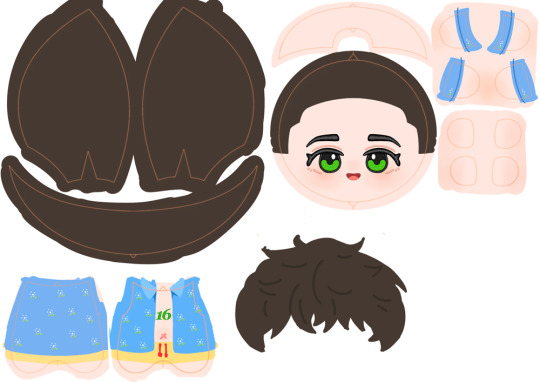


45 notes
·
View notes
Text
i'm broke and have hospital bills to pay. in better news, i'm selling art!
sketches and small drawings on paper, size ranging from 5x5 cm to an A4 sheet. various mediums. price ranging from $10 to $30 US.
example pieces:
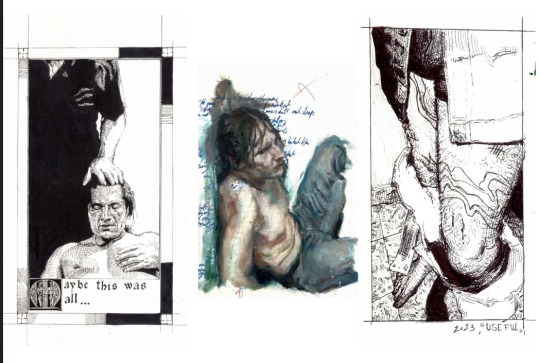

[image ID: six drawings in pen, oils, pencil and watercolours, three in each image. they are all relatively realistic. /.End ID]
disclaimer: being sketches, many of these pieces have miscellaneous text on the backside and/or were not painted on the highest quality paper. these sorts of issues will be handled on a case-by-case basis.
illustrations from my new skin for the old ceremony project, each the size of an A4 sheet. various mediums. price ranging from $35 to $50 US.
example pieces:
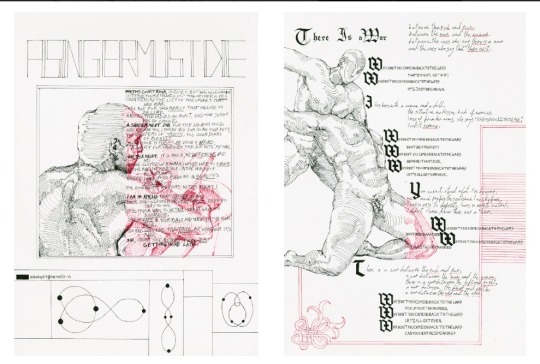
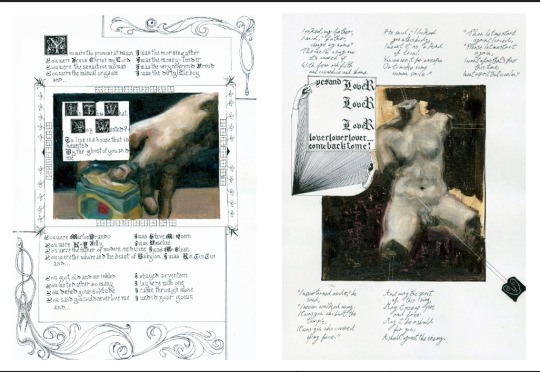
[image ID: four drawings in pen and oils, two in each image. each piece contains an illustration and sone handwritten text - the lyrics to the songs from new skin for the old ceremony. /.End ID]
larger paintings. oil on glass (approx. 70x100 cm), oil & watercolour on paper (100x140 cm), oil on embossed metal plate (approx. 55cm diameter). prices in the $200-$250 US range.
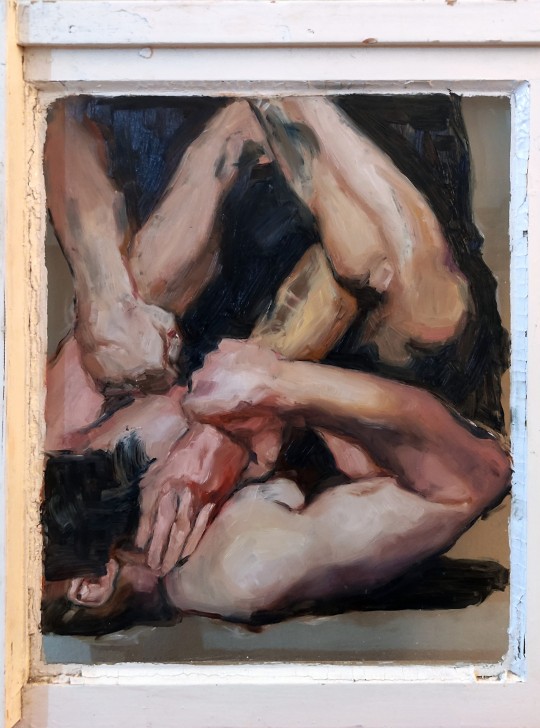
[image ID: an oil painting of two grappling figures, painted on a window. /.End ID]

[image ID: a watercolour and oil painting of two bare Chested figures, one lying down and the other kneeling. /.End ID]
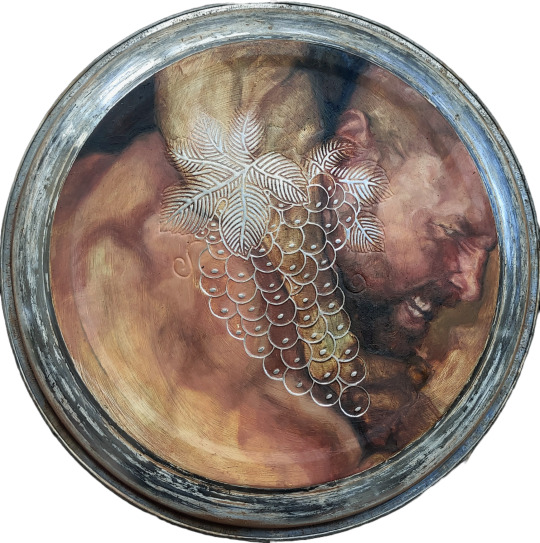
[image ID: an oil portrait of Jon Moxley, painted on an embossed metal plate. /.End ID]
if you are interested in any of the above, feel free to contact me through tumblr DMs, email at [email protected], or discord at tzaraat. i'll show you which pieces are available, and provide all necessary information.
disclaimer: much of my work is done on medium-low quality substrates (i don't like dropping entire paychecks on supplies, and i am no longer in school) or on found objects (like the window and plate). in addition, i often work on improperly primed or entirely unprimed substrates, or experiment with paint chemistry and the likes. as such, i can't really guarantee archivability. if any painting seems to me particularly fragile, i will disclose it and we can discuss what should be done with it.
i'm open to negotiation re: pricing and the like. feel free to contact me even if you can't afford it right now, and would like me to reserve a piece for a later date.
i also have a ko-fi:
thank you all ♡
243 notes
·
View notes
Text
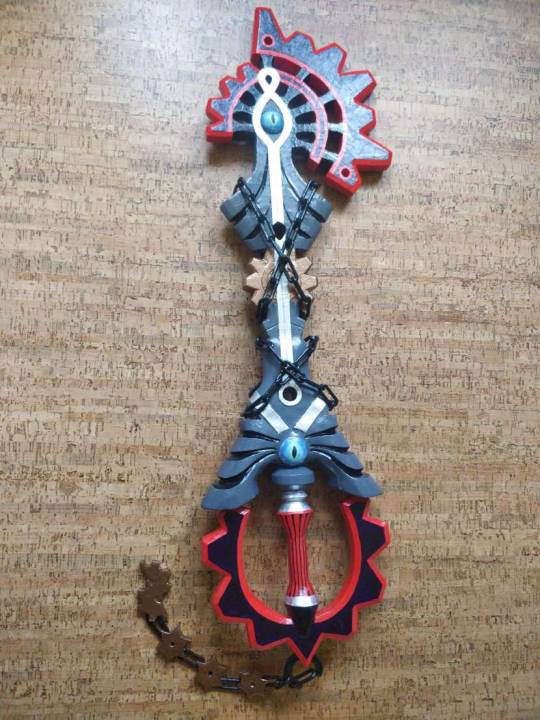

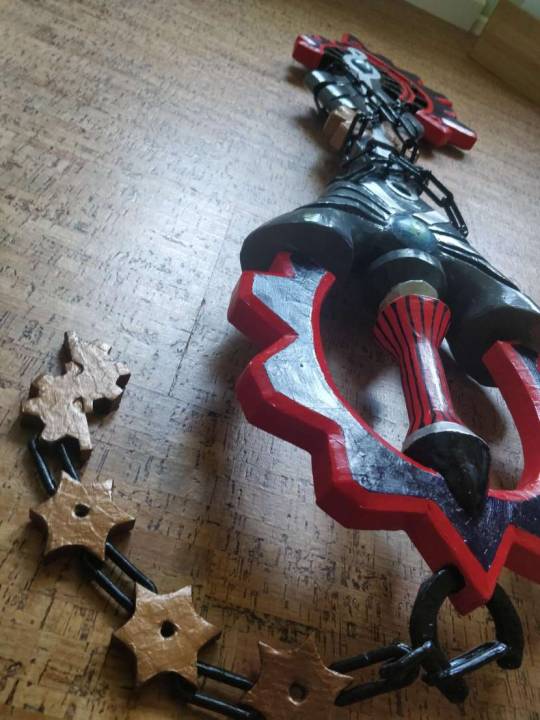
VOID GEAR! IS DONE!
I am so insanely happy with how this turned out, you would not believe me. Putting on the chains at the end was an actual pain, because they just would not hold and I didn't have the best glue to put them on either, but it's done now, and I'm just.
It's so pretty!
ALSO! If anyone wants to make one for themselves!
You can find the pattern I used there, the pages are for A4 format, which is like the typical german paper size. (about 30 cm x 21 cm). I made the blade from a 3 cm thick insulation board (I think that's the right word) and the chains are plastic chains I bought somewhere.
Also, if you have any questions regarding this, if you want to make one yourself and get stuck somewhere, I'd be happy to help! (Same goes for other Keyblades I made before! :D )
#kingdom hearts#diy#diy keyblades#void gear keyblade#vanitas kh#genuinely#one of the coolest things I've ever made#also#void gear looks hilarious where I put it on the wall next to my braveheart and kingdom key#because it's just so much more massive and detailed and colourful#i gotta post a group shot of them all at some point...
72 notes
·
View notes
Text
Goldsickness collection
So I bound a collection of goldsickness-centered fics and I'm pretty happy with how it turned out. This post is about the binding, and I'll do the fic recs in another post so they can be found separately later, but I'll still say a huge THANK YOU to the authors here for writing these and replying when I reached out!
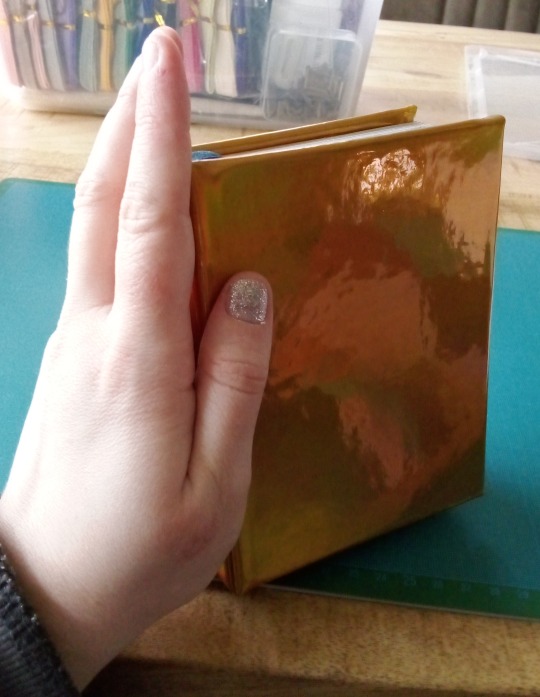
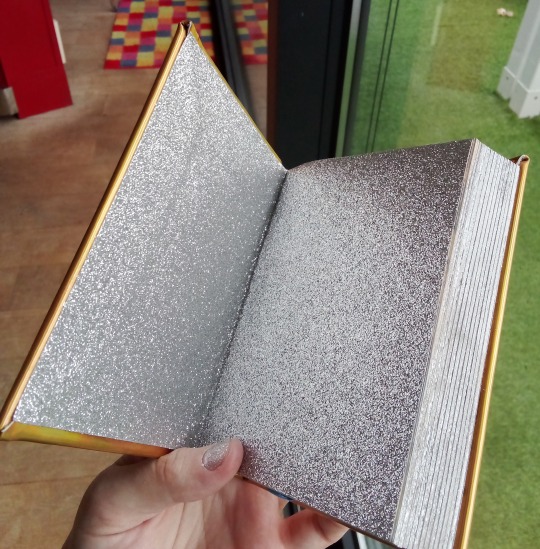
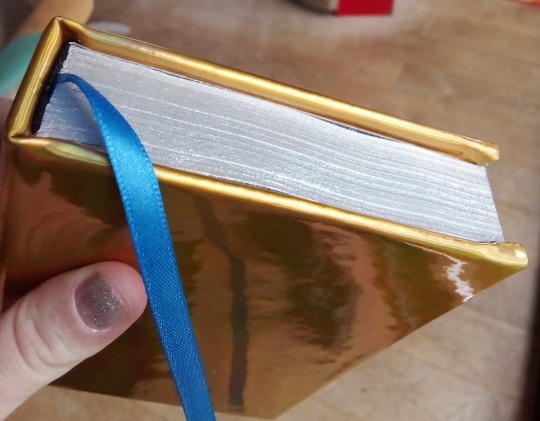

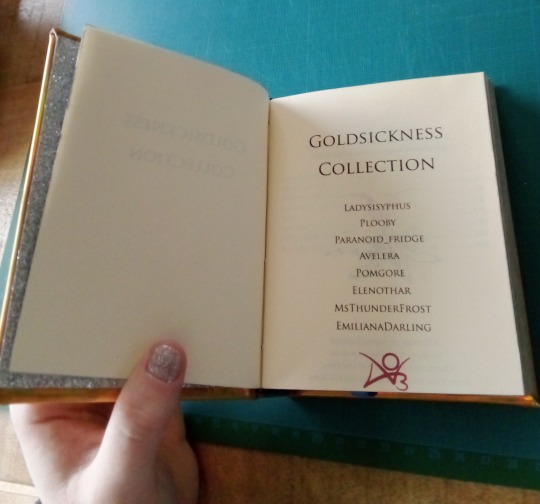
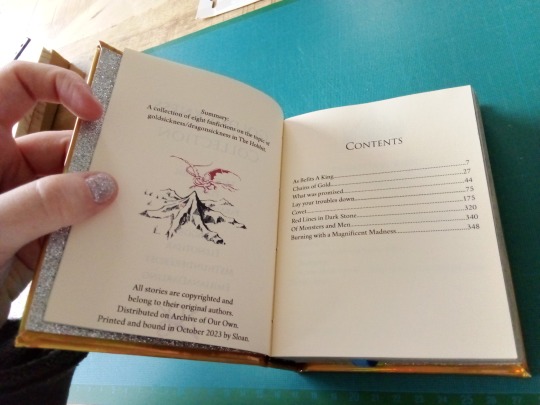

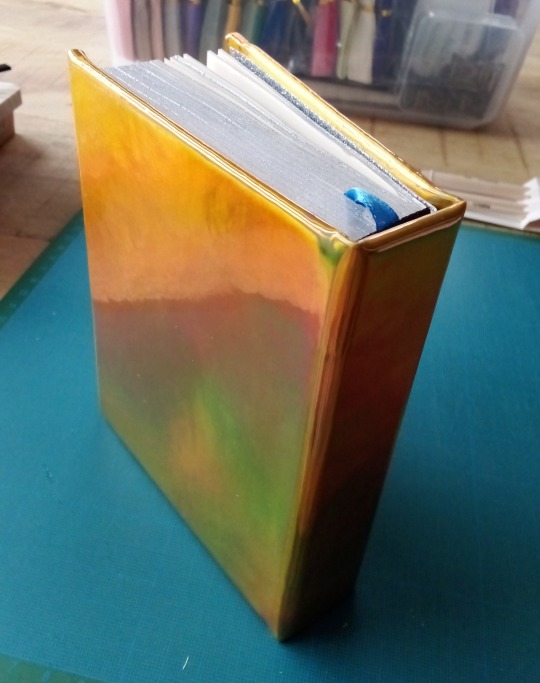
A list of the fics:
As Befits a King by @ladysisyphus
Chains of Gold by Plooby
What was promised by @stillparanoidnolongerafridge
Lay your troubles down by @avelera
Covet by @pomgore
Red Lines in Dark Stone by @elenothar
Of Monsters and Men by MsThunderFrost
Burning with a magnificent madness by EmilianaDarling
My intention with this binding was to make a book that could look like a jewel in Thrór's treasure hoard. I wanted it to evoke opulence, so it's voluntarily very busy for the eye. The fabric is holographic golden pleather (which is so hard to take a picture of, the book actually looks darker and truly gold, but the camera shows reflections from every angle), it looks like it's shifting in the light (and it gives me a headache if I stare at it too long, but I want to stare at it, which echoes the gold getting to Thorin's head nicely). The endpapers are sparkly like silver and diamond dust, and I gilded the edges for the first time. Notice the black headbands and blue ribbon as a callback to Thorin's hair and eyes.
This fantastic fanart and its colors were part of my inspiration.
Mistakes What I learned this time
The book has flaws, of course. The main problem is that I did a straight spine instead of a round one as I usally do: I misjudged the size difference between the text block and the cover, it should have been bigger because of the added thickness of the spine. I used a fabric that's very thick and unwieldy and not made for bookbinding, so I have big prominent corners. And since this is the first time I use a guillotine, I need to loose some habits I had when typesetting to get my margins to look good without cutting. This time, I actually could cut, and it was too tight. The acrylic paint gilding isn't great either.
But!
It's fine. It's a small book, but all the text I wanted to preserve is there, it's beautiful to me, and I'm very proud!
Materials:
Holographic pleather, 30x20 cm, amazon
Clairefontaine A4 paper, ivory color, 80g/m², bought in store
Acrylic paint Créalia, "matt silver pearl", cultura
Gray cardboard, 2mm thick, apg reliure
Ribbon, 6mm, amazon
Headband, amazon
118 notes
·
View notes
Text
I handmaded an A4 metric chart page template.
(because I'd like to design stickers and stuff at some point)
Very much handmade so it's not pixel perfect but it's nitid af.
These are some of the previsualizations in centimeters and inches. Under the cut are all the transparent versions.
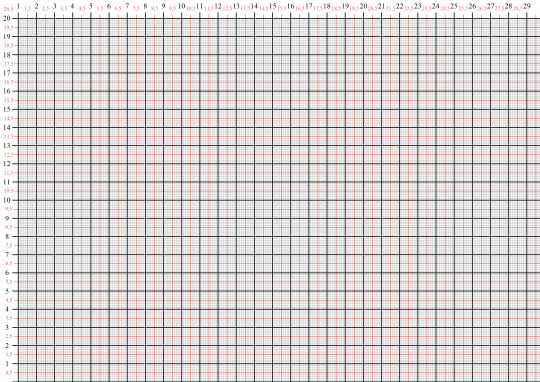
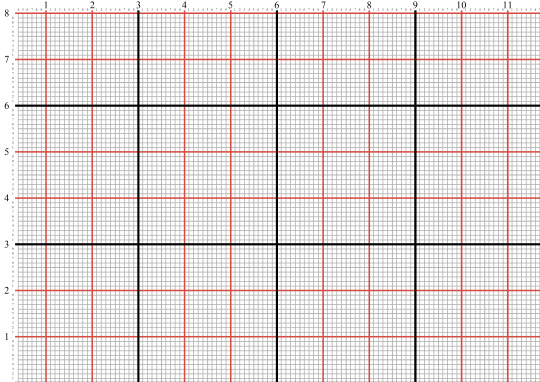
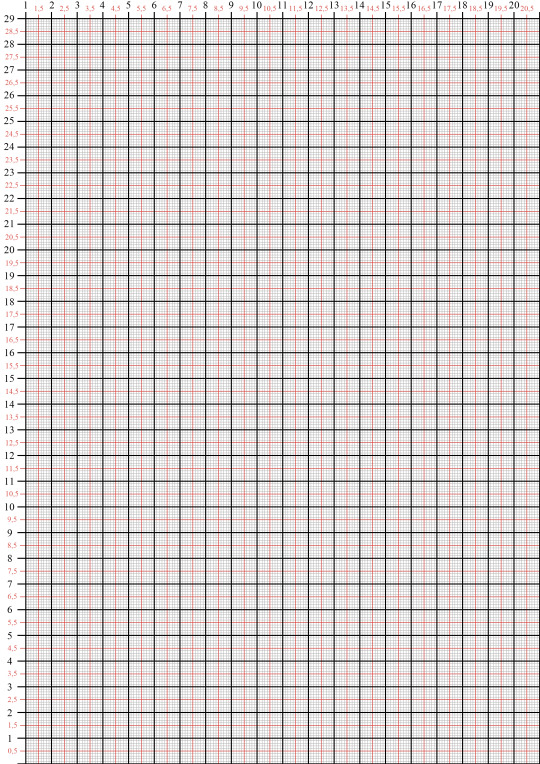
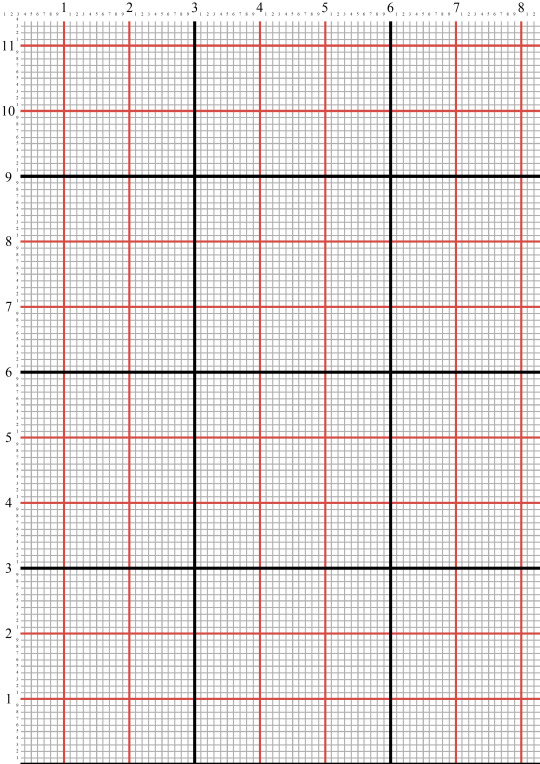
Remember to click the image and open it in another tab on desktop to download the correct size.
I just realized they are hard to see if you are on dark mode lol, sorry.
Horizontal cm
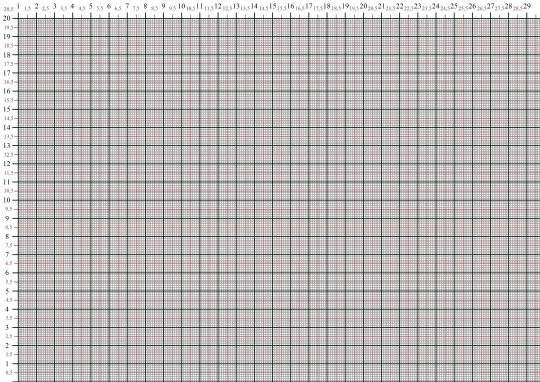
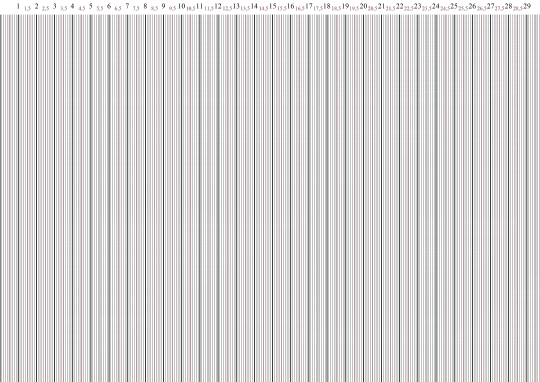
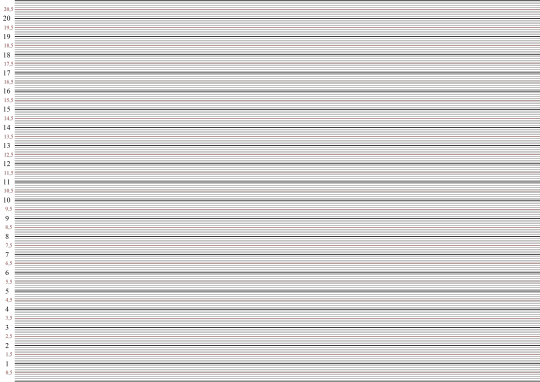



Horizontal in
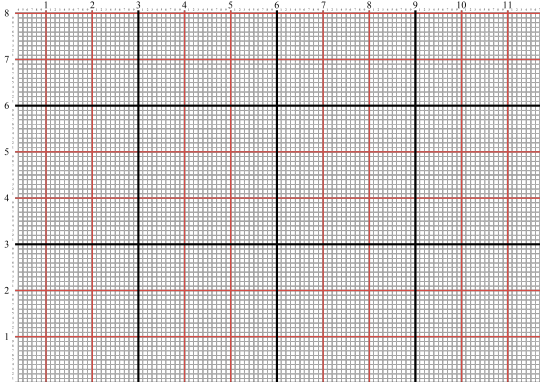
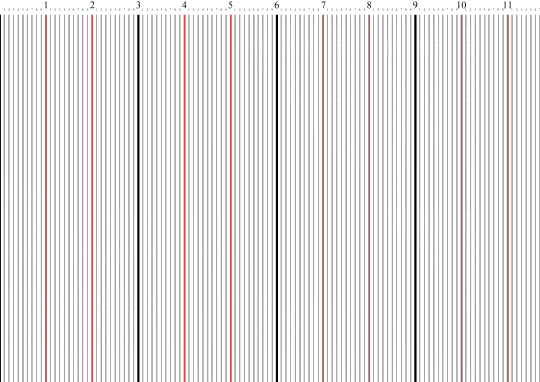
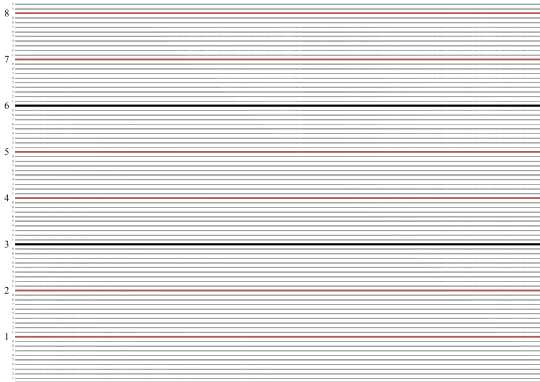
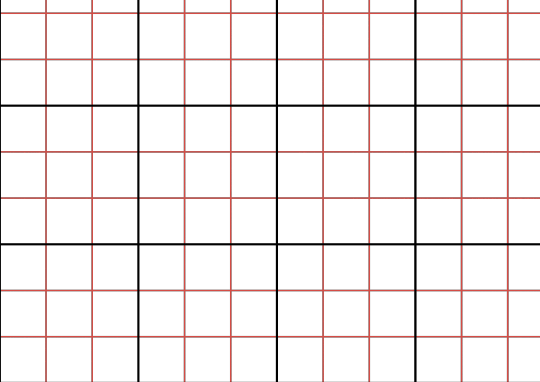
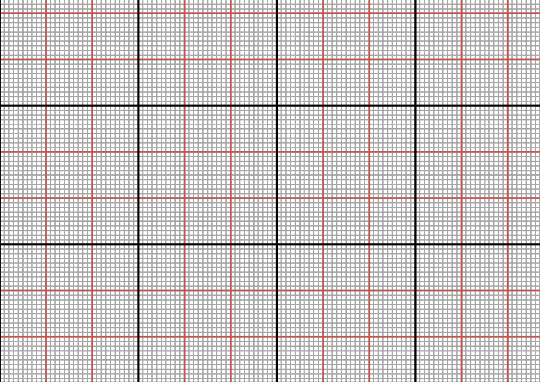
Vertical cm
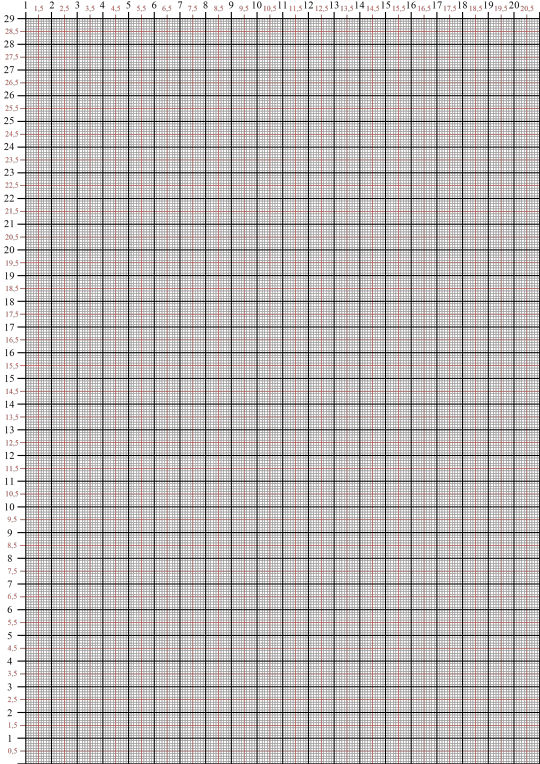
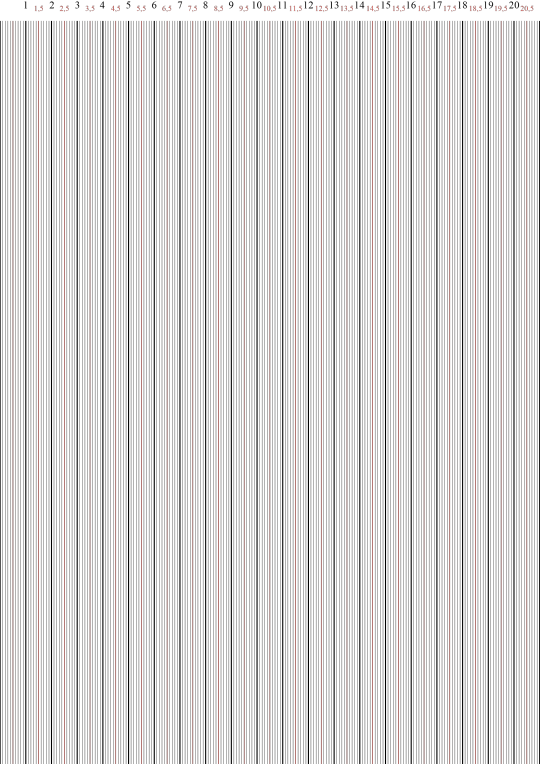
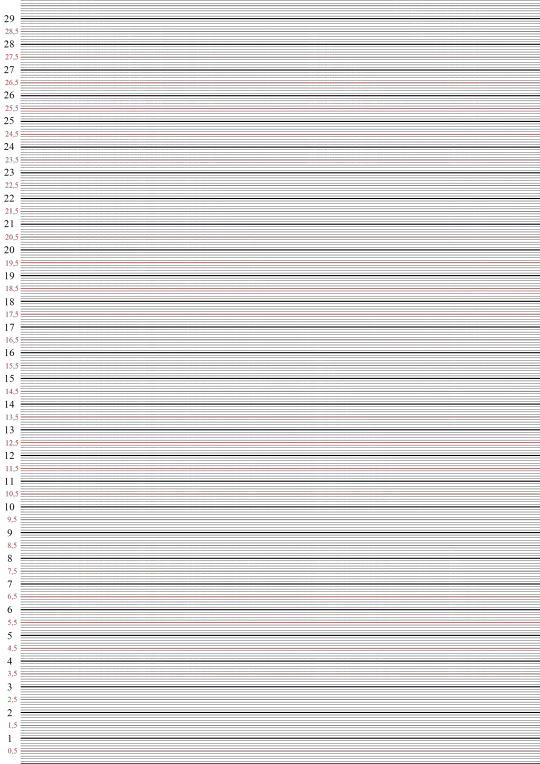

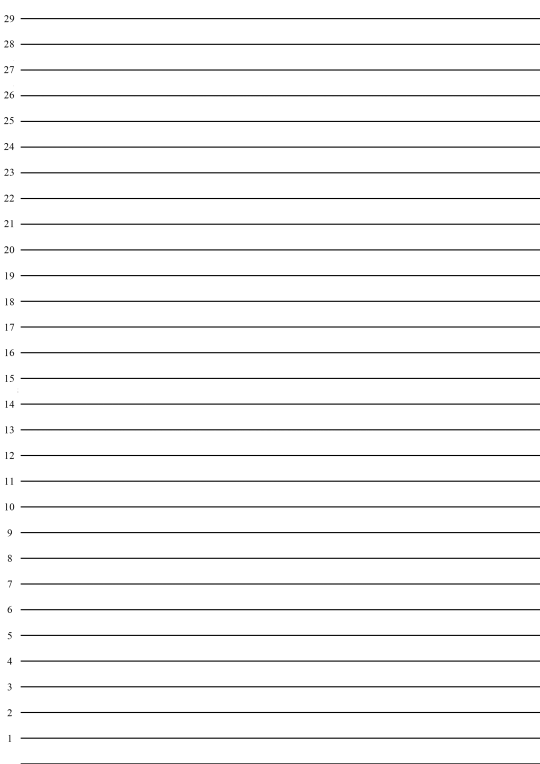

Vertical in
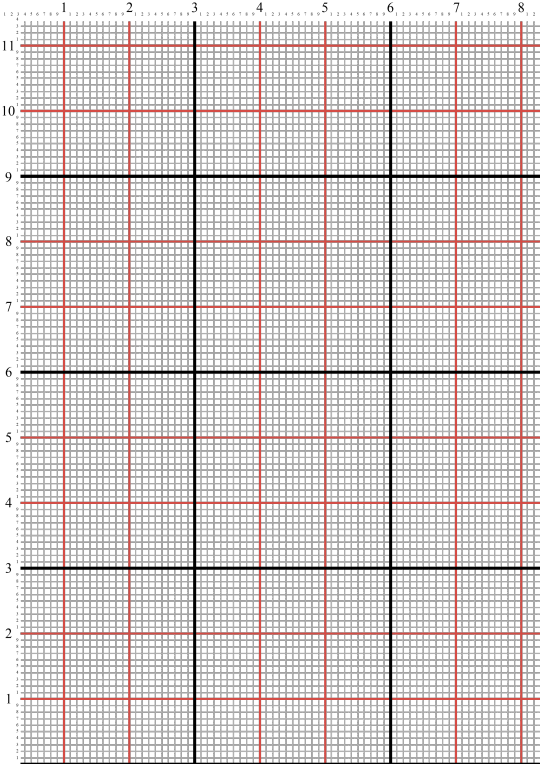
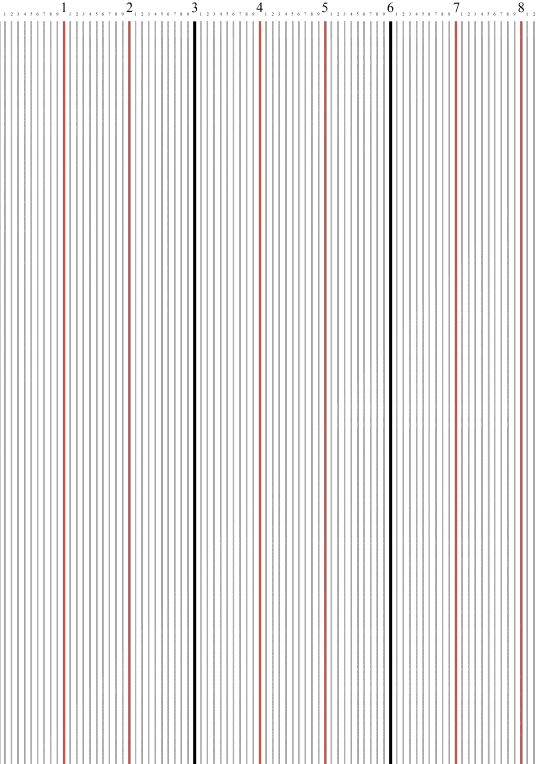
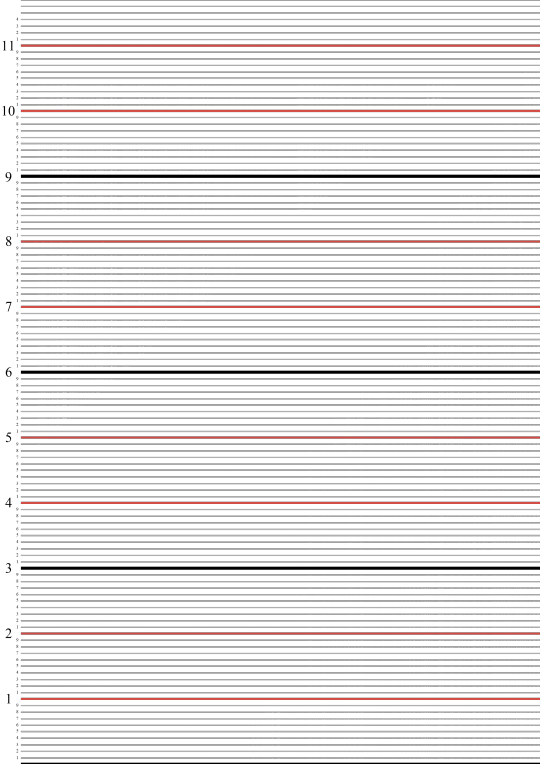
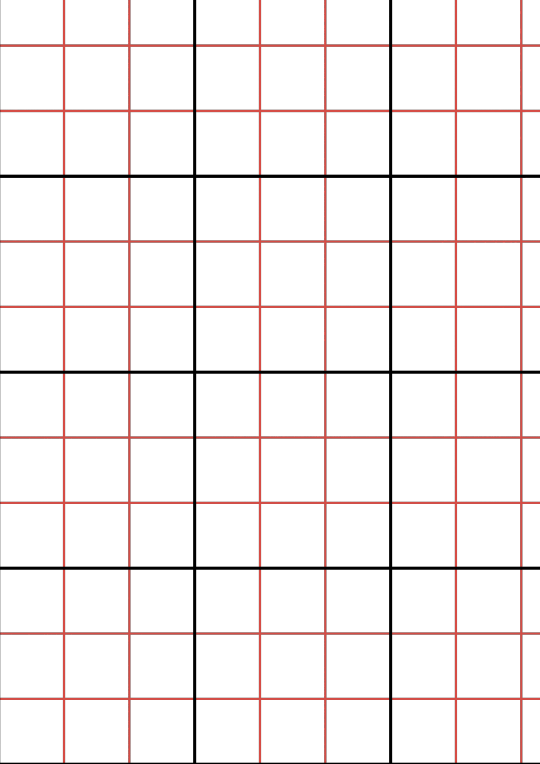
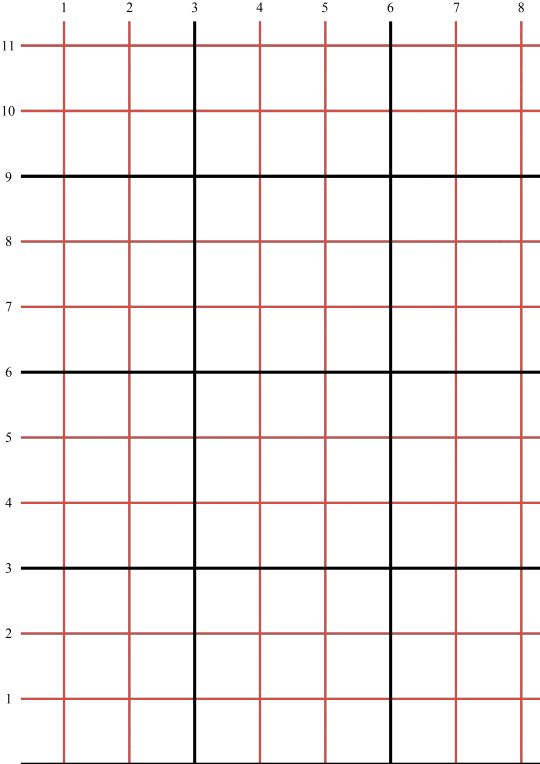
25 notes
·
View notes
Text

My print ko-fi shop is open for a limited time!
Here is the link. It will stay open until Wednesday, July 31st noon EDT, graphics will be shipped starting the week of August 5th.
There are total 20 + 1 graphics available, all at a size of 5 x 7 inches (~12.7 x 17.78 cm, slightly smaller than an A5) at €3 per graphic and 8.3 x 11.62 inches (~21 x 29.5 cm, about the size of an A4) at €5 per graphic.
If you are interested in a graphic not listed, do shoot me a message and I will see what I can do, there is a 99% chance I will be able to list it unless it is a very old graphic :3c
Reblogs much appreciated <3
#formula 1#f1#my shop#erika.txt#help the nerves are real despite this not being my first merch rodeo#i suppose when youre the only person running it gets scary. please dont let this flop <3
65 notes
·
View notes
Text

Orca surfacing sketch | Limited edition fine art print from an original drawing. My sketches start life as hand-drawn graphite images made on cartridge paper. I often work on these with charcoal, oil pastel or Caran d'Ache to create the look I'm after. The artwork is then scanned and finessed digitally ready for fine art printing. This process often referred to as Giclée printing uses the highest standard of printing methods to give gallery quality results that maintain all the details of the original sketch. The graphite pencils I use are Faber-Castel, the oil pastels are Sennelier and the china-graph is Caran d’Ache. The inks are pigment based archive quality (100years+). The heavyweight specialist papers I use are of the best professional quality having a wonderful surface designed specifically for fine art drawings and illustrations. Very limited editions with only ten per size printed. All artwork is signed and includes a certificate of authenticity. The A5 are 5.8" x 8.25" (14.8cm x 21cm) The A4 are 8.25" x 11.7" (21cm x 29.8cm) The A3 are 11.7" x 16.5" (29.8 cm x 42cm) The A2 are 16.5" x 23.4" (42 cm x 59.4cm) Originals are A3 11.7" x 16.5" (29.8 cm x 42cm) Frames not included in price. Free shipping on artwork to all destinations. https://www.seanbriggs.co.uk/product/orca-surfacing/?feed_id=6082&_unique_id=67909f263cb1c
17 notes
·
View notes
Text
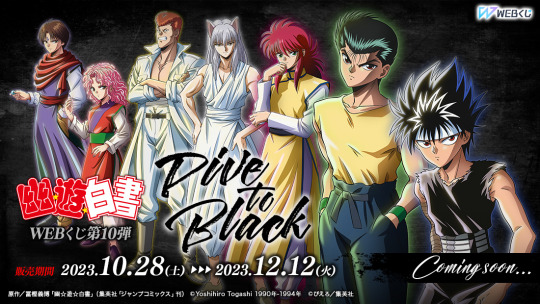







Yu Yu Hakusho WEBKUJI No. 10 ~Dive to Black~
The prizes of the 10th Yu Yu Hakusho Web Lottery have been disclosed! To celebrate the 10th edition, web-kuji has a luxurious lineup for the prizes! Also, for the first time, the goods will be sold at stores from October 28th, 2023. Available stores will be announced on the official site.
►Official site: web-kuji
►Lottery type: box type
►Sales period: October 28 (Sat) to December 12, 2023 (Tue)
►Selling price: 750 yen/ticket (tax included) *Up to 80 tickets per order
►Shipping: early to mid-February 2024
►Prizes:
PRIZE A: Big Bath Towel
Size: Extra Large (H600mm x W1200mm)
Material: polyester, cotton

PRIZE B: Big Acrylic Stand (7 types)
Size: Maximum height of 235mm (varies depending on the type)
Material: Acrylic (3mm thick)

PRIZE C: Tumbler (7 types)
Size: H135mm x φ85mm
Material: PP



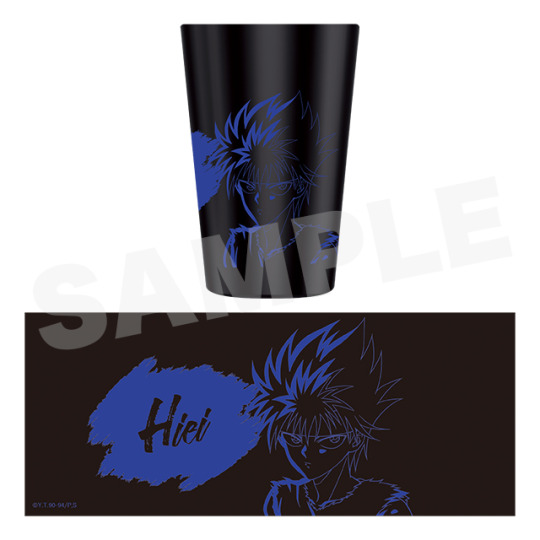
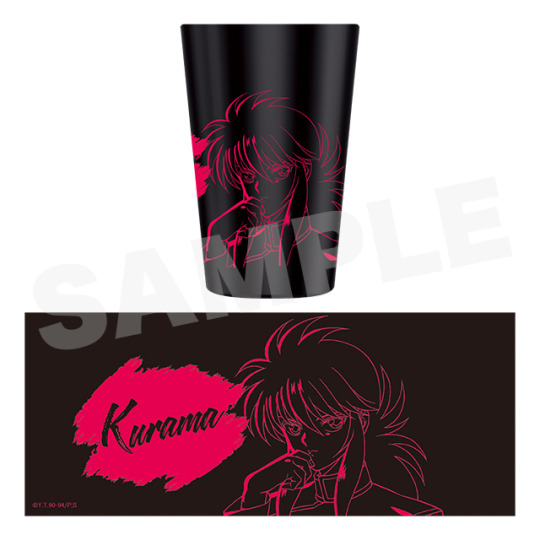
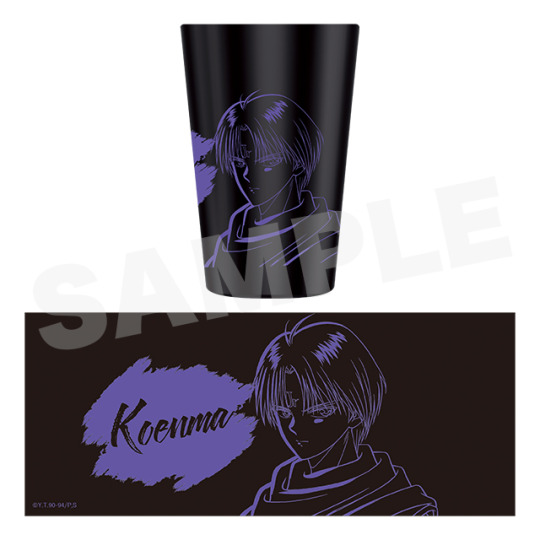


PRIZE D: Acrylic Stand (7 types)
Size: H120mm x W65mm
Material: Acrylic (3mm thick)

PRIZE E: Smoked Keychain (7 types)
A stylish keychain made of translucent acrylic.
Size: within H70mm x W50mm
Material: Acrylic (3mm thickness)/Alumina can

PRIZE F: A4 Art Board (8 types)
Size: H297mm x W210mm (A4)
Material: Cardboard (paper)
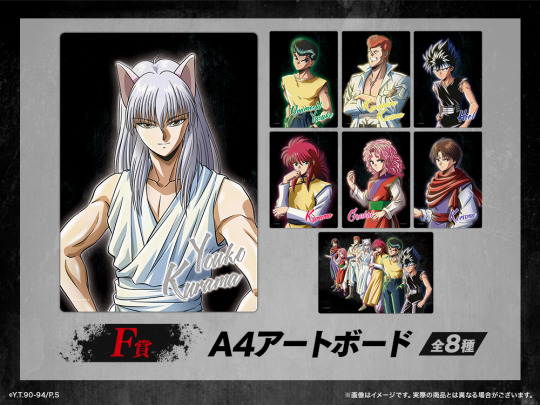
PRIZE G: Large Can Badges (7 types)
Size: φ76mm
Material: Tin
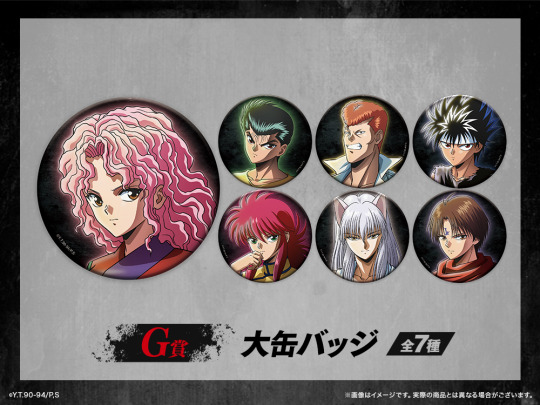
LAST WIN: Big Bath Towel (7 types)
A luxurious benefit that you will receive when you finish drawing all the lottery tickets in the BOX! This is a large bath towel measuring approximately 120 cm. You can choose the type of your choice.
Size: H1200mm x W600mm
Material: polyester, cotton
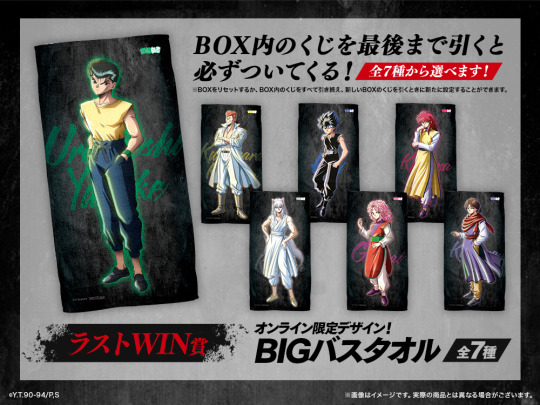
Big Bath Towel (at stores version, 1 type)
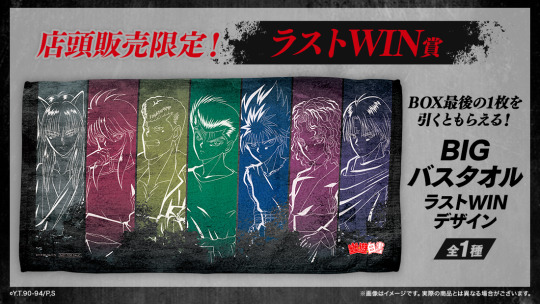
PURCHASE BENEFIT: Coaster (7 types)
For every 5 purchases per transaction, you will receive one random coaster!
*This gift is only available to those who purchase the lottery online, there will be no distribution at stores.
Size: H90mm x W90mm
Material: Cardboard

ONE MORE CHANCE: Acrylic Panel
10 people will be randomly selected from among the customers to receive an acrylic panel! Those who purchased at the stores can apply using the serial code on the lottery ticket stub.
Size: H150mm x W300mm
Material: Acrylic (3mm thick)/Metal (foot parts)

My fox hips don't lie hehehe....
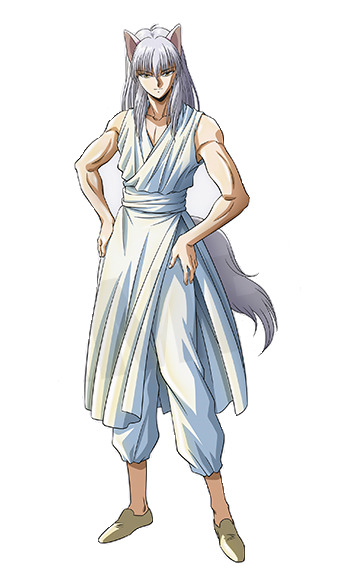
#Yu Yu Hakusho 10th WEB KUJI#Dive to Black#yusuke urameshi#hiei#kurama#kazuma kuwabara#koenma#Genkai#Dark Tournament#Youko Kurama
81 notes
·
View notes
Text
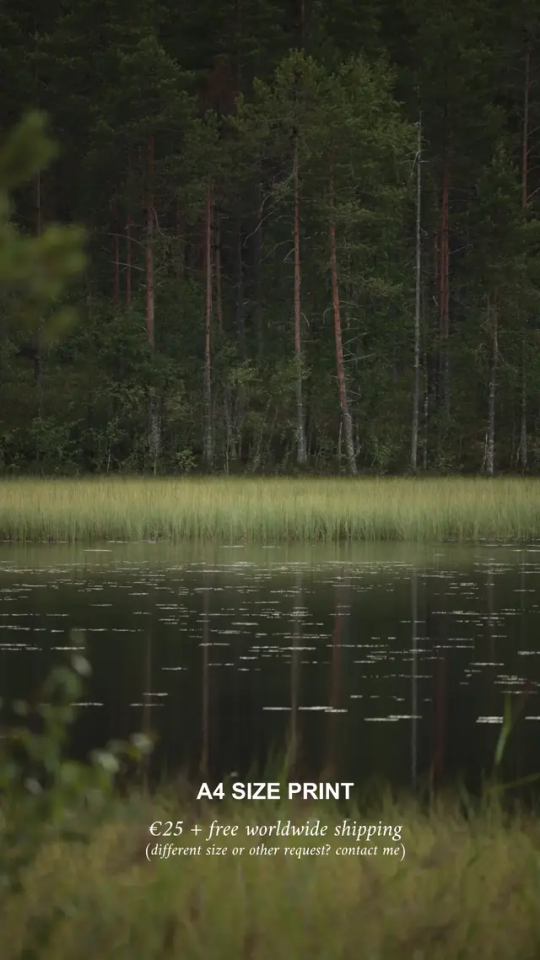
A4 size print
Almost all my photos are available as photo prints
€25 incl. free shipping worldwide A4 size (20 x 30 cm | 8 x 11 ¾ in) Fujifilm photo paper matte or glossy
Different size or other request? Contact me
>> More on my Instagram
59 notes
·
View notes